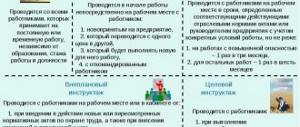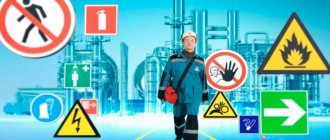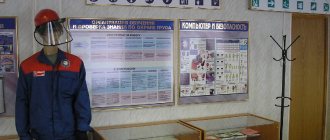In the article you will learn what types of liability for violation of labor protection requirements exist for employees and persons responsible for labor protection in an organization, and provides links to legislative acts on the basis of which this or that liability arises.
Labor protection is a system for preserving the life and health of workers in the process of work, which includes legal, socio-economic, organizational and technical, sanitary and hygienic, treatment and preventive, rehabilitation and other measures (Article 209 of the Labor Code of the Russian Federation).
- Legal activities: maintaining documentation in the organization, concluding individual and collective labor contracts, adopting internal labor regulations, developing instructions and rules on labor protection, etc.
- Socio-economic: compulsory insurance of employees, payment of all required compensations and provision of benefits.
- Organizational and technical: conducting a special assessment of working conditions, optimization and training of personnel, etc.
- Sanitary and hygienic: providing workers with special clothing and safety shoes, detergents, etc.
- Preventive: sports activities for employees, mandatory medical examinations.
The requirements of the Labor Code of the Russian Federation in the field of labor protection are defined in Chapter 34, the employer’s obligations to ensure safe conditions and labor protection are set out in Article 212 of the Labor Code of the Russian Federation. That is, the employer and officials responsible for labor protection must ensure proper working conditions for each employee—otherwise, those responsible will be held accountable. Article 419 of the Labor Code of the Russian Federation states that, depending on the nature and extent of the violations, employees of the organization and other persons guilty of violating labor laws may be held liable for the following types of liability:
- Disciplinary responsibility.
- Material liability.
- Civil liability.
- Administrative responsibility.
- Criminal liability.
Article 419 “Types of liability for violation of labor laws”
In this publication you will learn what types of liability for violation of labor protection requirements exist for workers and persons responsible for labor protection at the enterprise.
This article provides links to legislative acts on the basis of which this or that liability arises. The head of any organization, regardless of its form of ownership, must ensure the safety of any work. In turn, employees are obliged to comply with labor protection requirements.
Responsibility for violation of labor protection requirements is prescribed in Article 419 of the Labor Code of the Russian Federation.
Article 419 of the Labor Code of the Russian Federation states that, depending on the nature and extent of the violations, employees of the organization and other persons guilty of violating labor laws may be held liable for the following types of liability:
1. Disciplinary responsibility. 2. Financial responsibility. 3. Civil liability. 4. Administrative responsibility. 5. Criminal liability for violation of labor protection requirements.
Let us consider in more detail all types of liability for violation of labor protection requirements.
Criminal liability
Criminal liability for violation of labor protection requirements is a type of liability of officials for violation of the Criminal Code of the Russian Federation (Criminal Code of the Russian Federation) in terms of labor protection and industrial safety. The most severe punishment is provided for this responsibility. Criminal liability may arise in the event of unintentional harm to a person’s health, or his death during an emergency at a specific facility (collision, accident, fire, disaster). The Criminal Code of the Russian Federation also contains several articles that indicate signs of violation of labor safety standards. Criminal liability for violation of labor protection requirements is stipulated in:
- Art. 143 “Violation of labor protection rules.”
- Art. 216 “Violation of safety rules when conducting mining, construction or other work.”
- Art. 217 “Violation of safety rules at explosive objects.”
- Art. 218 “Violation of the rules for accounting, storage, transportation and use of explosives, flammable substances and pyrotechnic products.”
- Art. 219 of the Criminal Code of the Russian Federation “Violation of fire safety requirements.”
The specificity of this type of liability is that only individuals are involved in it (for example, specific employees of an organization or the head of an enterprise).
Considering criminal cases for violation of labor protection and safety requirements, based on judicial practice, labor protection specialists began to be held criminally liable
Article 143 of the Criminal Code of the Russian Federation provides for liability depending on the severity of the incident: causing by negligence; death of 1 person due to negligence; death of 2 or more people due to negligence. In this case, the person may suffer one of the following types of punishment:
- a fine of up to 400 thousand rubles or in the amount of wages or other income convicted for a period of up to 18 months, or
- correctional labor for up to 2 years, or
- forced labor for up to 1 year, or
- imprisonment for up to 1 year, with the possibility (not necessarily) of deprivation of the right to engage in activities for up to 1 year.
Thus, the legislator, in relation to those guilty of violating labor protection requirements, is not limited only to disciplinary or financial liability provided for by the Labor Code of the Russian Federation. If their actions contain elements of an administrative offense or crime, they can also be held accountable under the norms of the Code of Administrative Offenses and the Criminal Code of the Russian Federation - it all depends on the severity and nature of the violation.
If the information was useful, leave comments and share the link to this article on your social networks. Thank you!
Disciplinary liability for violation of labor protection legislation
Disciplinary liability for violation of labor protection requirements is a type of liability that occurs for violation of labor discipline in the field of labor protection and industrial safety. Disciplinary liability for violation of labor protection rules is the most common type of violation.
Employees of the organization, as well as persons responsible for compliance with labor protection requirements, may be subject to disciplinary liability.
What is the employee’s responsibility for violating labor protection requirements?
Employees are subject to disciplinary liability for violating labor safety rules in the following cases:
— employee liability for violation of internal rules and regulations on labor protection; — violation of labor protection instructions for safe work; — evasion of medical examination; — refusal to undergo special training on labor protection during working hours.
Depending on the severity of the fault, the employer has the right:
— make a remark to the employee; - reprimand the employee; - severely reprimand the employee; - dismiss the employee.
″Can an employer fire an employee for violating labor safety requirements?
An employer may terminate an employment contract with an employee for:
1. Repeated violation of labor protection requirements - for the first violation of labor protection requirements, the employee receives a reprimand, for the second - a reprimand, and for the third - dismissal.
2. A single gross violation of labor protection requirements is a situation that led to an accident or incident. Or a situation that could lead to an accident or mishap.
Watch the video answering this question:
What is the employer's responsibility for violating labor protection requirements?
Occupational safety specialists and other responsible persons of the organization may be subject to disciplinary action in the following cases:
- the employee is allowed to work, but the equipment on which he is supposed to work is faulty; — the employee is allowed to work on equipment in violation of its technological use; - the employee is allowed to work on unprotected equipment, if such protection is provided; — the employee was not provided with personal protective equipment, if such protective equipment is provided; — the employee has not undergone special training and testing of knowledge on labor protection; — the employee did not undergo a medical examination; - the employee was sent to work that is contraindicated for him due to health reasons; - the employee was involved in overtime work without his consent, as well as in cases where he cannot be involved in overtime work according to the law.
What is the procedure for bringing to disciplinary liability for violation of labor safety rules?
The procedure for applying disciplinary sanctions is specified in Art. 193 Labor Code of the Russian Federation. Having established a disciplinary violation, the manager is obliged to demand a written explanation from the violator. Failure to provide a written explanation does not exempt the perpetrator from disciplinary liability.
Disciplinary liability has a statute of limitations of 1 month. The punishment must be formalized properly, that is, a corresponding order is issued about its imposition, which the guilty person familiarizes himself with under signature within the next 3 days from the date of issue.
Disciplinary punishment is automatically lifted a year from the moment it was imposed, provided that there is no new punishment (Article 194 of the Labor Code of the Russian Federation). Removal of guilt can be made earlier at the request of the employee or his boss and is formalized by order.
An employee may appeal the imposition of a disciplinary sanction to the labor dispute commission within 90 days from the date of being subject to an unreasonably imposed penalty.
Common Cases
Most often, liability for violation of labor protection legislation occurs in the following cases:
- non-compliance with the rule on mandatory training on safe work practices (lack of internship, refusal to test knowledge, hiring an untrained employee, lack of training for the management of the enterprise, etc.);
- non-compliance with the established work and rest schedule (involvement of an employee in activities at night and on weekends without his consent, involvement in overtime work, failure to record it, non-compliance with requirements for the duration of continuous rest);
- lack of personal protective equipment;
- access to the facility without a mandatory medical examination;
- lack of workplace certification;
- failure to comply with the established procedure for investigating accidents;
- non-compliance with the rules of operation of devices and apparatus;
- organization of work that does not meet mandatory requirements.
Financial liability for violation of labor protection requirements
Financial liability for violation of labor protection requirements is compensation by the employee for damage caused to the employer as a result of violations of labor protection requirements.
For example, employees may be subject to this type of liability if their violation of labor protection instructions and rules for the safe operation of machinery and equipment resulted in damage to the employer’s property.
An employee can be held financially liable if:
- the employee is an adult; - the employer received obvious actual damage; - the employee was inactive or exhibited illegal actions; - the employee’s guilt in causing damage to the employer has been proven.
An employee who caused damage may be required to compensate for material damage in full or in part, when a citizen is required to compensate an amount not exceeding his average monthly salary.
According to Article 247 of the Labor Code of the Russian Federation, the employee is obliged to compensate for material losses if his guilt is proven by the employer and such damage can be calculated. At the same time, according to Article 238 of the Labor Code of the Russian Federation, the employer’s lost profits are not taken into account.
It should be noted that, according to Article 240 of the Labor Code of the Russian Federation, the employer may completely or partially refuse to receive compensation for damage from the guilty party.
Safety violations at nuclear facilities
Violation of safety at nuclear energy facilities, if it could lead (but did not lead) to consequences in the form of contamination of the environment with radiation or the death of a citizen, is punishable in accordance with Article 215 of the Criminal Code of the Russian Federation:
- fine up to 200,000 rubles;
- or total income for a period of up to 18 months;
- or restriction of freedom for up to 3 years;
- or forced labor for up to 3 years with a ban on holding certain positions for the same period or a ban on engaging in certain types of activities for up to 3 years or without this ban;
- or imprisonment for up to 3 years with a ban on holding certain positions for the same period or a ban on engaging in certain types of activities for up to 3 years or without this ban.
The same violation, if it led to contamination of the environment or the death of a citizen/causing serious harm to health, is punishable in accordance with Article 215 of the Criminal Code of the Russian Federation:
- forced labor for up to 5 years with a ban on holding certain positions for the same period or a ban on engaging in certain types of activities for up to 3 years or without this ban;
- imprisonment for up to 5 years with a ban on holding certain positions for the same period or a ban on engaging in certain types of activities for up to 3 years or without this ban.
The same violation, if it led to consequences in the form of death of 2 or more persons due to negligence, is punishable in accordance with Article 215 of the Criminal Code of the Russian Federation:
- forced labor for up to 5 years with a ban on holding certain positions for the same period or a ban on engaging in certain types of activities for up to 3 years or without this ban;
- imprisonment for up to 7 years with a ban on holding certain positions for the same period or a ban on engaging in certain types of activities for up to 3 years or without this ban.
Download for viewing and printing:
Article 215 of the Criminal Code of the Russian Federation
Civil liability for violation of labor protection legislation
Civil liability is the responsibility of a person for violating the Civil Code of the Russian Federation (Civil Code of the Russian Federation) and federal laws adopted in accordance with it.
This measure of responsibility may be imposed on the offender along with disciplinary, administrative and criminal liability. A characteristic feature of this liability is compensation for damage caused to the injured party.
Civil liability for violation of labor protection requirements is established in Chapter 59 of the Civil Code of the Russian Federation.
Civil liability arises for officials in the event of harm or violation of the rights of other entities. In this case, officials are obliged to compensate for property or moral damage to the injured party, depending on the type of offense.
Depending on the basis for applying liability measures, there are:
— contractual liability; - non-contractual liability.
Depending on the nature, there are:
— shared responsibility; — joint liability; - subsidiary liability.
Protection of violated rights is carried out by courts of general jurisdiction, arbitration and arbitration courts in a special procedural manner using the norms of the Civil Code of the Russian Federation.
Increase in fines
The amount of administrative fines has been significantly increased. Previously, their maximum amount per official was 5,000 rubles, and in 2021 it can reach up to 40,000 rubles . For legal entities, these figures increased from 50,000 to 200,000 thousand rubles.
The greatest increase was observed in sanctions for violation of labor safety standards. The maximum fine can be 80,000 rubles . For individual violations, this amount will reach 130,000 rubles .
These include, for example, sending workers to perform direct duties without proper medical examination and knowledge of labor protection rules.
Of course, the presented rule of law is formulated in such a way that each violation is a separate offense in relation to a specific employee. If previously an enterprise in which a large number of workers were not trained in labor safety rules paid a fine of 50,000 rubles , now they are required to pay the established amount of the fine for each employee separately.
Also, a warning has appeared in the legislation, which represents a new administrative penalty.
At first glance, it is more profitable for entrepreneurs, since it does not require payment of a fine, but a prerequisite for the introduction of this punishment is the publication of information about identified violations in the media.
Repeated violation of the requirements established by law when concluding an employment contract or repeated violation when concluding a civil contract instead of an employment contract is punishable by disqualification of officials for a period of one to three years. That is, in this case, administrative fines will not be introduced, and the law provides for more stringent penalties.
Administrative liability for violation of labor protection requirements
Administrative liability is a type of liability for violation of the Code of Administrative Offenses of the Russian Federation (CAO RF) and regulatory documents adopted in accordance with it.
Managers, officials and other responsible employees are held administratively liable for violation of labor protection legislation.
″What should a labor protection specialist do if he is brought to administrative responsibility?
There are three options for the development of events:
1. Pay a fine if you admit that you committed a violation.
2. Pay the fine, but ask the administration of the enterprise to compensate for the fine you paid if you are sure that you were fined for violations that are not specified in your job descriptions. This practice occurs quite often.
3. Contact the head of the inspector who checked you, or go to court if you completely disagree with the violations that are being charged to you.
Watch a video on this topic:
The administrative responsibility of the employer for violation of labor protection requirements is specified in Article 5.27.1 of the Code of Administrative Offenses of the Russian Federation “Violation of state regulatory requirements for labor protection contained in federal laws and other regulatory legal acts of the Russian Federation”:
- liability for violation of labor protection legislation, including the Labor Code of the Russian Federation (chapters 34-37), a fine is provided for officials, as well as for individual entrepreneurs - from 2 to 5 thousand rubles, for legal entities. persons – from 50 to 80 thousand rubles;
— for failure to conduct or incorrect conduct of a special assessment of working conditions at workplaces, a fine is provided for persons responsible for labor protection, as well as for individual entrepreneurs - from 5 to 10 thousand rubles, for legal entities. persons – from 60 to 80 thousand rubles.
— for access by an employee without special training and testing of knowledge on labor protection, as well as without undergoing medical examinations, a fine is provided for officials, as well as for individual entrepreneurs - from 15 to 25 thousand rubles, for legal entities. persons – from 110 to 130 thousand rubles;
- for employee access without personal protective equipment (PPE), a fine for officials, as well as for individual entrepreneurs - from 20 to 30 thousand rubles, for legal entities. persons – from 130 to 150 thousand rubles;
— for repeated violation of the above points, a fine is provided for officials - from 30 to 40 thousand rubles, or suspension from work for a period of 1 to 3 years. For individual entrepreneurs – a fine of 30 to 40 thousand rubles, or suspension of activities for up to 3 months. For legal entities persons – a fine of 100 to 200 thousand rubles, or suspension of activities for up to 3 months.
The decision to impose penalties in the form of fines is made by inspectors or heads of State supervision bodies. Cases of administrative violations are considered by courts and authorized government bodies. The imposition of an administrative penalty does not relieve a person from performing his duties in the activity in which the violation was committed.
Consequences of violating safety rules
Direct consequences
The direct consequences of violating safety regulations include:
- causing harm to individuals working at a hazardous enterprise or living in the surrounding area;
- causing harm to individuals through contamination of air and water with dangerous substances;
- the spread of radiation dangerous to the life and health of people and other living beings;
- soil contamination, as a result of which various plant crops cannot grow on it, or as a result of which plant crops change their natural structure;
- fires and explosions at businesses that threaten adjacent commercial and residential areas;
- emissions of hazardous, poisonous and toxic gases into the atmosphere.
Indirect consequences
Indirect consequences can affect even those citizens who live far from the place of the incident:
- resettlement of people from the disaster zone;
- deterioration of the environmental situation;
- job cuts;
- public discontent;
- mass riots;
- social tension;
- extinction of fauna and flora;
- temporary loss of work by people (for example, until the enterprise is restored).
Increasing the statute of limitations
An important change was also the increase in the statute of limitations for bringing administrative liability from two months to one year. For example, if an enterprise violated the requirements established by the legislator , a legal entity or individual could solve this problem before the scheduled inspection. Employers could not be held administratively or otherwise liable if all detected inconsistencies were not found again more than two months before the inspection, since the statute of limitations had expired. Today it is impossible responsibility This is not possible even if violations are corrected immediately upon discovery. Employers need to check compliance with all labor and safety laws. If violations are detected, they must be corrected immediately, which will reduce the risk of prosecution.










